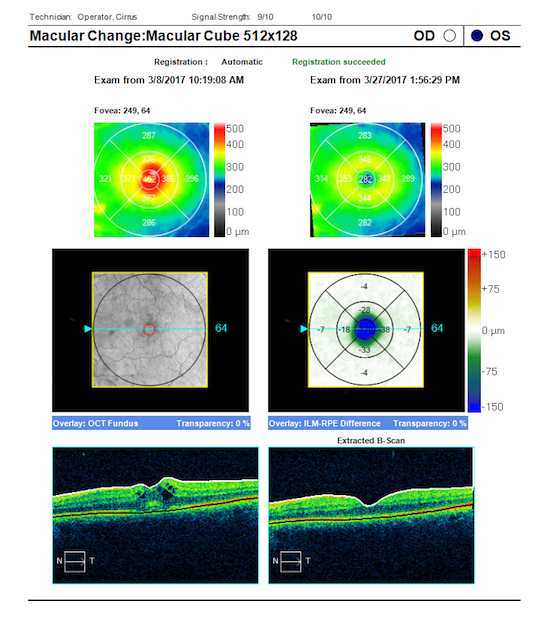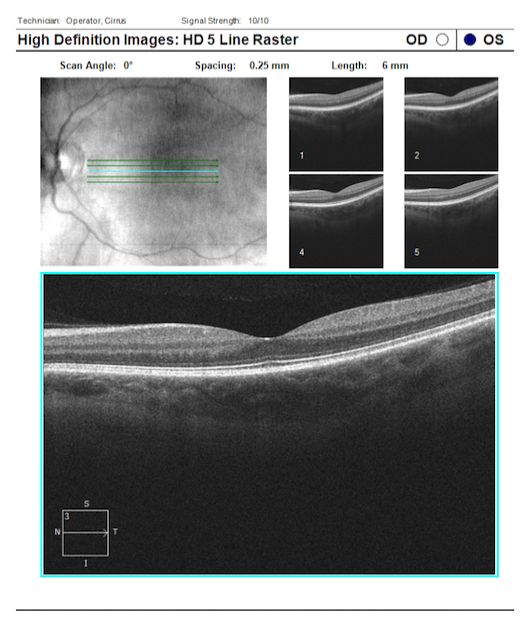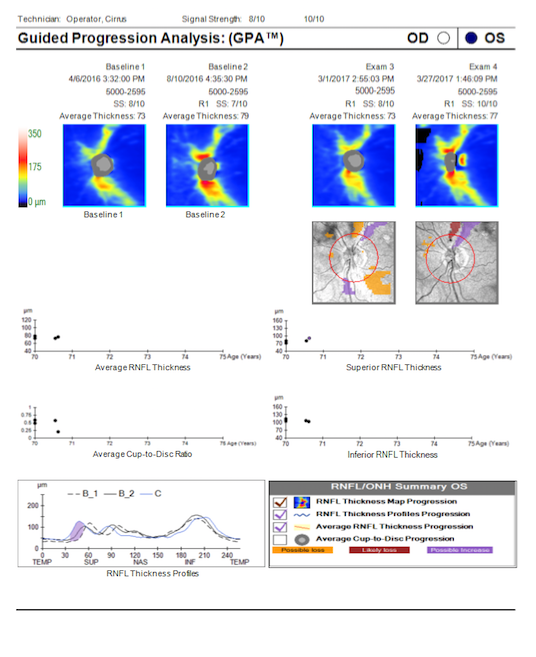Retinal Eye Exam in Dallas, TX
What is a Retinal Exam?
A healthy retina is essential to maintaining clear vision and overall eye functioning. A retinal eye exam at Infinity Vision in Dallas, Texas may be recommended by your doctor if any potential retinal abnormalities were detected during a general eye exam, or for patients at a higher risk of developing retinal conditions such as diabetes, macular degeneration, retinal detachment and more.
During a retinal eye exam and consultation, your doctor will perform series of diagnostic procedures in order to evaluate the retina for any signs of disease or abnormalities. These tests may include visual field test, fundus photography, and ocular coherence tomography (OCT) and more.
Your doctor will take the time to discuss the results of your eye exam and eye test, as well as any potential risks of retinal disease with you. Patient education and understanding is a top priority of our practice, as it often helps patients achieve the most effective treatment as they know how to care for their condition.
For more information about receiving a retinal eye exam and consultation from Infinity Vision in Dallas, give us a call today!
Ocular Coherence Tomography
Ocular coherence tomography, also known as OCT, is an imaging system that utilizes light waves to produce a high-resolution view of the cross-section of the retina and other structures in the interior of the eye during a retinal eye exam. The generated images can help detect and treat various serious eye conditions, including:
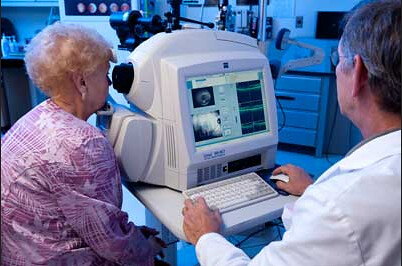 Macular Hole
Macular Hole- Macular Swelling
- Optic Nerve Damage
- Age-Related Macular Degeneration
- Macular Pucker
- Glaucoma
- Cataracts
- Diabetic Eye Disease
- Vitreous Hemorrhage
OCT uses technology similar to that of a CT scan. With the scattering of light, it rapidly scans the eye to create an accurate cross-section. Each layer of the retina can be evaluated, measured and compared to normal, healthy images of the retina.
The OCT eye exam takes about 10 to 20 minutes to perform and usually requires dilation of the pupils.
Can I drive after a retinal eye exam?
 For retinal eye exams, we usually need to dilate the patient’s eyes with special eye drops. It takes about 20 minutes for the eyes to fully dilate and be ready for examination by Dr. Russell or Dr. Winslow. These drops make your vision blurry as the pupils will not change size depending on the light entering the eye, and they stay this way for about four hours. During this time you won’t be able to drive a car and you’ll need to wear dark sunglasses to block the light. You will need to have someone drive you home from your retinal imaging test because of this. After about four hours, your eyes should be back to normal.
For retinal eye exams, we usually need to dilate the patient’s eyes with special eye drops. It takes about 20 minutes for the eyes to fully dilate and be ready for examination by Dr. Russell or Dr. Winslow. These drops make your vision blurry as the pupils will not change size depending on the light entering the eye, and they stay this way for about four hours. During this time you won’t be able to drive a car and you’ll need to wear dark sunglasses to block the light. You will need to have someone drive you home from your retinal imaging test because of this. After about four hours, your eyes should be back to normal.
How much does a retinal eye exam cost?
These tests can be a part of a typical eye exam, or they can be specially requested to help detect health conditions such as diabetes, macular degeneration, glaucoma, and retinal toxicity caused by certain arthritis drugs. The costs are usually covered by either insurance or Medicare.
How often should I get a retinal eye exam?
These examinations of the retina, where the pupils are dilated, are not necessary with every regular eye exam. During a regular eye exam that isn’t focused solely on the retina, an ophthalmoscope can be used to look at the back of the eye and the retina. Whether or not you need a specific retinal eye exam varies between patients.
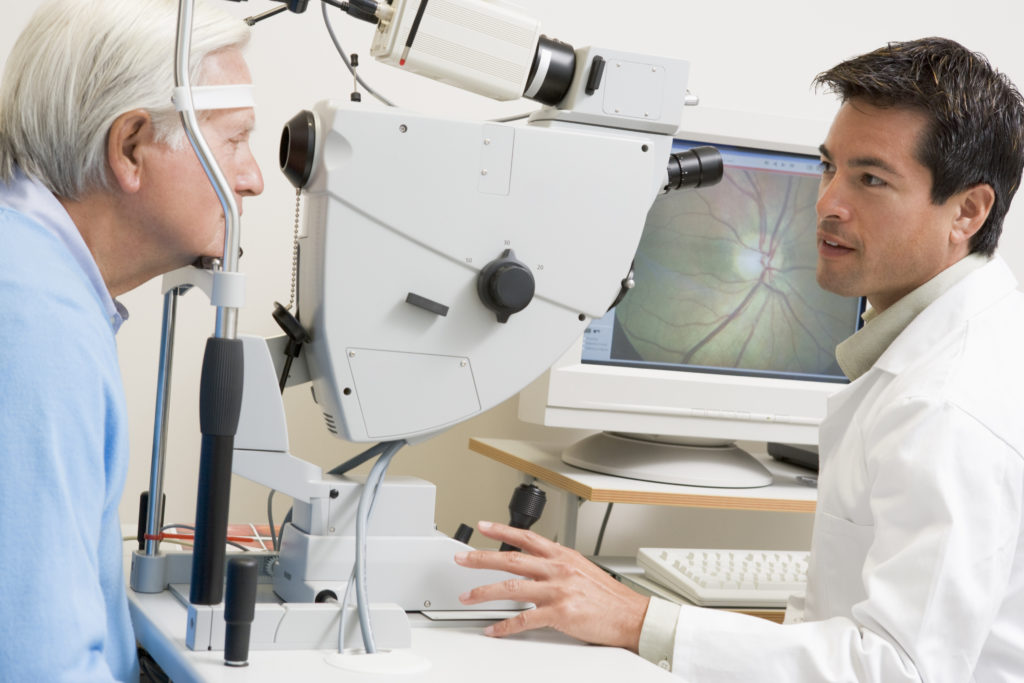 As for regular eye exams, this is the schedule recommended by the American Optometric Association (AOA) for when everyone should get an eye exam:
As for regular eye exams, this is the schedule recommended by the American Optometric Association (AOA) for when everyone should get an eye exam:
- Children 5 years and younger — Children under three should see a pediatrician check for the most common eye problems, such as the lazy eye. Otherwise, children between 3 and 5 should see a pediatric ophthalmologist for an eye exam.
- School-age children and teens — Your child needs his or her vision checked before they enter first grade. From there, vision should be checked every one or two years to be sure their refraction/vision correction prescription hasn’t changed.
- Adults — If you don’t have vision problems and don’t have a family history of eye disease, this is the schedule for adults:
-
-
-
-
- Every five to 10 years in your 20s and 30s
- Every two to four years from 40 to 54
- Every one to three years from 55 to 64
- Every year after age 65
-
-
-
-
These adult numbers should increase in frequency if you wear glasses or contact lenses, if you have a family history of eye disease, or if you have a chronic disease that can affect your eyes, such as diabetes.
My eyes seem fine. Why should I have a retinal eye exam?
Eye diseases and conditions can be sneaky — they often begin to damage your eyesight long before you notice any symptoms. Macular degeneration, glaucoma, diabetic retinopathy, and others usually don’t present the kinds of symptoms you would associate with other areas of your body. You won’t have any pain and you won’t notice changes.
Take glaucoma, for instance, which is caused by pressure building inside your eye. Glaucoma is usually caused by a blockage in the eye’s normal drainage system, the trabecular meshwork. Because the eye is not draining, pressure builds and it eventually begins to damage the optic nerve, which is the pathway that information gets from your retina up to your brain where it can be translated into what you’re seeing. You won’t feel changes in the pressure. In fact, the first signs you’ll see if you haven’t had your eyes examined for some time will be decreases in your peripheral vision. And this loss of vision is permanent. But during an eye exam, a glaucoma test is included to check that the pressure inside your eye is normal.
Is it really worth risking your eyesight by not having eye exams on a schedule that fits your age?
Schedule an Appointment Today!
If you are in need of a retinal eye exam, call Infinity Vision today at (214) 522-2661 or fill out our online Contact Form here. We proudly serve patients from Dallas, TX and surrounding areas.


